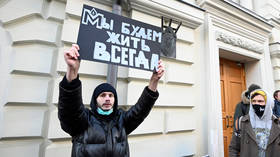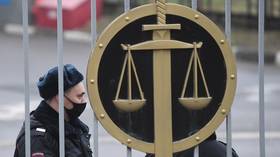Russian NGO Memorial International appeals liquidation

The Russian NGO Memorial International, dedicated to remembering those killed during Communist repressions, has appealed a court decision handed down last December, which forced it to shut up shop and abandon all operations in the country.
Representatives of the organization, which had already been labeled a “foreign agent” by the Ministry of Justice over its links to overseas funding, told the TASS news agency on Monday that they had submitted an appeal in an attempt to overturn the decision. The organization had been given 30 days to take action after the ruling, which came on December 28.
Memorial, which was founded in the Soviet Union in the late 1980s, consists of two separate legal entities: Memorial International, which carries out historical research into crimes committed by the USSR, and the Memorial Human Rights Centre, which defines its mission as advocating for human rights in contemporary society.
In 2014, the Russian Ministry of Justice declared the Human Rights Centre a “foreign agent,” in line with a recent law requiring entities that receive foreign funding and engage in political work to disclose that status on all published material. In 2016, the label was extended to include Memorial International.
In November last year, prosecutors filed applications to dissolve both entities, citing “repeated and gross breaches” of the foreign agent laws. At the hearing, they also argued that Memorial’s historical work was “creating a false image of the USSR as a terrorist state” and that, although the NGO had been “created as an organization to perpetuate historical memory,” it was now “almost completely focused on distorting historical memory, primarily about the Great Patriotic War,” as the Second World War is often referred to in Russia.
In December, a court ordered the liquidation of both branches of Memorial. After the decision, the European Court of Human Rights called on Russia not to implement the dissolution, and referred to a motion filed by an array of Russian organizations in 2013 challenging the “foreign agent” laws.
The laws have been criticized both domestically and internationally as an infringement on free speech, and, last August, a group of Russian journalists published an open letter decrying what they called “the persecution of independent journalism in this country.” This month, the editor of the popular online magazine Republic announced that the publication had been labeled a foreign agent not because it received direct funding from abroad, but because it counted several foreign embassies among its subscribers – 0.18% of its total circulation.
In December, President Vladimir Putin said the laws would be reviewed with input from the “professional community,” and acknowledged that certain examples of their implementation were “comical – a completely excessive response.” Later that month, however, a group of MPs rejected claims that the measures violated civil rights, and indicated that they could be expanded further if deemed helpful to law enforcement.













